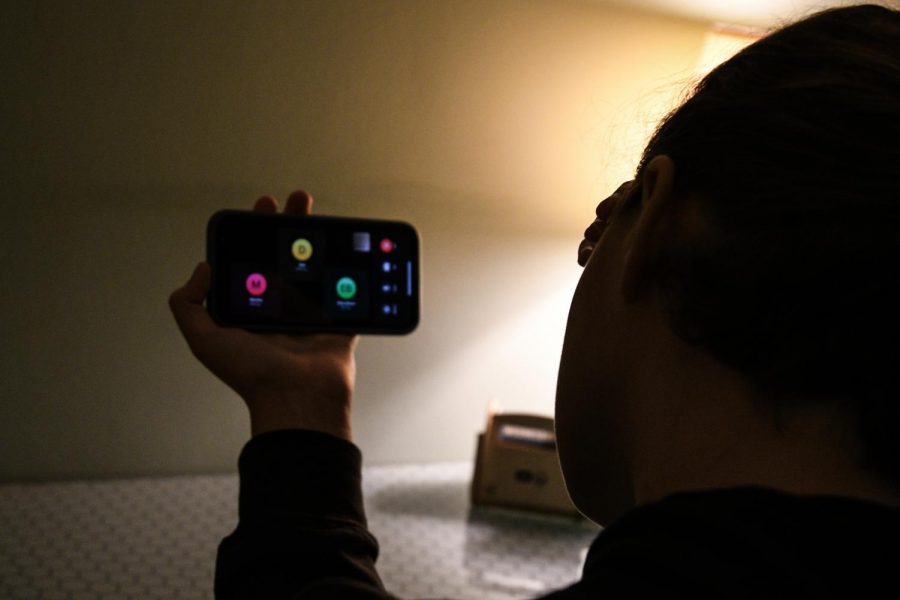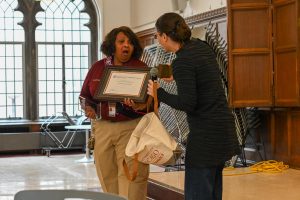Pandemic Problems: Social isolation reveals importance of human connection
As the pandemic has continued, students have faced new challenges navigating social interactions, leading some students to relax their diligence about getting infected with the coronavirus. Some have completely avoided in-person socialization, while others formed small pods, where members reduce risk by committing to interactions only with a limited group.
April 9, 2021
For many students, quarantine and distance learning has negatively impacted their mental health and left them feeling socially isolated. Students share their experiences with isolation, what they wished their peers knew, and a therapist weighs in on the importance of human connection.
“I noticed myself talking to less people and being less engaged in conversation. Um, and it really impacted my mental health. Pretty sure I fell into some type of depression, because I was just staying alone all the time and just like slept and ate, and that was my day,” Destiny said.
That was student Destiney Williamson recounting the hardship of being socially isolated during the COVID-19 pandemic. For many students, quarantine and distance learning has negatively impacted their mental health and left them feeling socially isolated.
For Kiran Chinniah, it was not being able to see her friends on a consistent basis that made the first few months of quarantine isolating.
“At the beginning of the pandemic, I feel like it was really hard for me just ‘cause I was so used to seeing my friends all day, every day. I live at home with just my mom, so it’s just the two of us, so it was hard to really only be two people,” Kiran said.
Students started this school year virtually, but without some of the modifications that had been made last spring, such as grading on a pass/fail system and lightening the assigned workload. Regularly-paced classes in a virtual format contributed to feelings of burnout for Audrey Matzke.
“If I remember correctly, it was around the beginning of October. I just completely stopped being able to do schoolwork. It was just a sort of moment of stubbornness almost, like I couldn’t lift my pencil, I couldn’t log into a Zoom class. And, I certainly was frustrated with myself, because I didn’t understand. Like, I’ve been doing school for 12 years, like what’s stopping me now? Like I’m a senior, I’m about to graduate. Why am I not doing my work?” said Audrey.
As the pandemic drags on, students have found ways to cope with feelings of overload and isolation. Destiney has started using Zoom to connect with some of her friends for weekly game nights.
“Every few weeks or every week or so, I have game night with my friends. We all play games, and it’s really fun. Or um, connecting with people that you haven’t talked to in a long time. I started talking to people I went to elementary school with, and that’s always a good time to see where people ended up and what’s going on in their lives now,” Destiny said.
While videochat is a great temporary solution, it’s not enough to combat long-term feelings of loneliness, according to Audrey.
“Relying on other people, especially remotely, to help support you just doesn’t work. And there are some things that like even just talking about them with other people, it helps you get through it but it’s not really a long-term solution, because like it’s kind of the core of our experience during this pandemic. We’re alone, like we have to live with ourselves and live with our own, you know, thought processes, and like that to me has been the hardest part. ‘Cause like, you know, your friend doesn’t answer your text immediately or they can’t FaceTime the one night you need the to, like everyone gets busy, and what do you do then?” Audrey said.
As we proceeded with the transition into hybrid learning and continue to grapple with the social restrictions of the pandemic U-High counselor and certified therapist Michael Bruner encourages students to use the technologies available to facilitate connection.
“Focusing on using those as not, you know, not time spent together via those medium. I think sometimes we’re looking for substitutes for the substitutes for human connection, right we’re and in some ways I don’t think they exist. So using the tools we have to connect as much as possible, but then also using the tools we have to get really connected,” Mr. Bruner said.
Supporting friends over video chat certainly isn’t ideal, but it is better than nothing, in the opinion of Asha Patel, who feels that checking in on friends is incredibly beneficial.
“I think our generation is getting better at being more supportive in this term, in these ways, that people are being more open about their mental health, so all my friends have been super supportive about it and just been like, “Yeah, if you want to hang out,” I mean “if you want to Zoom,” or something ‘cause I haven’t hung out with people in a while, “like I’m totally open to that.” And just, you know, giving space to people and, you know, checking in with them. Even the smallest things. Like, “Oh, hey, I really miss you. Bye,” you know, those things always mean the biggest to everybody pretty much,” Asha said.
For Audrey, they think one of the most helpful things is being empathetic and validating others’ feelings and experiences.
“Whatever you can do as a student to, not even just reassure them verbally, but just demonstrate to them that like you’re not looking to compare yourself to them, you’re not looking to condemn them for being lazy, or write their struggles off as like something that they could have controlled if only they had tried hard enough,” Audrey said.
According to Mr. Bruner, it’s important to check in with friends, but also to validate and acknowledge your own feelings.
“It’s through the process of feeling our feelings that we increase our capacity to manage and endure our feelings. Feelings are a part of life, we all have them. Um and I think part of what’s happening is that we are well, um we have a lot of practice with putting distance between ourselves and our feelings,” Mr. Bruner said.
Reporting for the U-High Midway, I’m Téa Tamburo.




























































